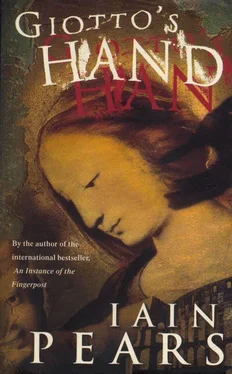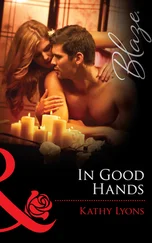Iain Pears - Giotto's Hand
Здесь есть возможность читать онлайн «Iain Pears - Giotto's Hand» весь текст электронной книги совершенно бесплатно (целиком полную версию без сокращений). В некоторых случаях можно слушать аудио, скачать через торрент в формате fb2 и присутствует краткое содержание. Город: London, Год выпуска: 1994, ISBN: 1994, Издательство: Harper Collins, Жанр: Исторический детектив, на английском языке. Описание произведения, (предисловие) а так же отзывы посетителей доступны на портале библиотеки ЛибКат.
- Название:Giotto's Hand
- Автор:
- Издательство:Harper Collins
- Жанр:
- Год:1994
- Город:London
- ISBN:978-0-00-232531-8
- Рейтинг книги:5 / 5. Голосов: 1
-
Избранное:Добавить в избранное
- Отзывы:
-
Ваша оценка:
- 100
- 1
- 2
- 3
- 4
- 5
Giotto's Hand: краткое содержание, описание и аннотация
Предлагаем к чтению аннотацию, описание, краткое содержание или предисловие (зависит от того, что написал сам автор книги «Giotto's Hand»). Если вы не нашли необходимую информацию о книге — напишите в комментариях, мы постараемся отыскать её.
Giotto's Hand — читать онлайн бесплатно полную книгу (весь текст) целиком
Ниже представлен текст книги, разбитый по страницам. Система сохранения места последней прочитанной страницы, позволяет с удобством читать онлайн бесплатно книгу «Giotto's Hand», без необходимости каждый раз заново искать на чём Вы остановились. Поставьте закладку, и сможете в любой момент перейти на страницу, на которой закончили чтение.
Интервал:
Закладка:
Mary Verney continued to look calm, but companionably distressed at such an unsatisfactory conclusion.
“The trouble is, of course,” Flavia went on, “that however agreeable this is as an explanation, it is not true.”
“Oh. Are you sure?”
“Fairly certain, yes.” .
“Why?”
“Firstly, because the police say they went out of their way to make sure that Jessica Forster did not learn from them that her husband was suspected of any thefts. They say they asked her about matters surrounding his death. Nothing about anything else. She may have known he was a thief, but there was nothing to let her know that anyone else suspected and that she had to act. So, how did she know?”
There was a long silence as Mrs. Verney drained her glass, then spoke: “Simple. I told her.”
“Why?”
“Why do you think? I don’t like her much, but living with Geoffrey was punishment enough for one lifetime. There was no need for her to suffer from him beyond the grave. I wanted to spare the poor thing the turmoil of having everything she owned—or he owned—taken away from her by vengeful victims. So when she came to visit that afternoon I told her that if she was going to do anything to defend herself, she’d have to move fast. Personally, I think it was good advice.”
“And she rushed out with the matches?”
“No. I rushed out with the matches. She was dithering too much to do anything herself. She asked my advice, and I gave it. She asked my help, and I gave that too.”
“That is a serious offence.”
Mrs. Verney seemed blithely unconcerned. “I can’t see how it changes anything, myself.”
Flavia gave her a look of profound disapproval. “Very humanitarian of you. It’s a pity it’s not true either.”
“I’m afraid it is. I nearly put my back out lifting all that paper.”
“I don’t mean that. I mean your motives. You did not put the idea into her head to get rid of evidence indicating Forster was a thief. Nor did you do it when she came to visit.”
“No?”
“No. You did it to disguise the fact that there wasn’t the slightest bit of evidence that he was a crook. And you went round to see to it after we got back from London and Jonathan said he’d be looking into his papers to see what he sold from here.”
“But it was raining.”
“It was stopping when we arrived.”
“And why would I do that? What was it to me?”
“Because the papers would have probably revealed that he was bleeding you and your family dry by threatening to reveal that for years your kleptomaniacal cousin had been touring the country houses of Europe lifting masterpieces.”
“Goodness! What a lovely idea. What leads you to that?”
“Enough, I think.”
“For example?”
“Forster, to start off with. What evidence is there that he stole paintings? Suggestions by three people, his comments to Jonathan, and his death. But he hardly lived like a vastly successful criminal; there were obvious signs of a shortage of money, and no indications at all that any is hidden away.
“He is meant to have spent ages touring round Europe stealing things, but his wife said he hated travelling and had hardly left Norfolk except for day trips to London since he moved here. He was, admittedly, in Florence when the Uccello disappeared. But so was your cousin Veronica, at della Quercia’s. Virtually next door and with access to the Palazzo Straga. And your cousin was on the guest list for the Dunkeld wedding in 1976 and he was not. Your cousin had a reputation for taking things; whereas until last week, Forster did not.
“None of that is enough to acquit Forster or condemn your cousin. But think of his relations with her. She didn’t like him in Florence, it seems, but brings him in to help look after the collection. Why? It hardly needed looking after. She pays him a salary, virtually gives him a house, and begins to transfer other property in a way which made it entirely his when she died. A lot of money for not very much. If he was a thief it doesn’t make sense. If he was blackmailing a thief, then it does.”
Mary Verney took a sip of her glass, and regarded Flavia with some affection. Flavia noted that she seemed neither indignant at listening to such a travesty, nor nervous about it either.
“I see. Interesting. But I wouldn’t try going to court on it. Even Dr. Johnson—indiscreet old buffer though he is—would have a hard time persuading a jury that someone as obviously scatty as my poor old cousin could manage the sort of planning your Giotto would have required for success. I mean, stealing things is only part of it, isn’t it?”
“Oh, yes. And I’m sure that her success was largely because she stole things at random, knew only faded and impecunious aristocrats like herself whose collections are precisely the sort which aren’t catalogued or insured too well. It took Bottando to turn lunacy into method, and see craziness as breathtaking skill. As for getting rid of them, she wouldn’t have to. Winterton would do that.”
Mary looked surprised at the name. “Winterton? Why him?”
“Come now,” Flavia said severely. “You can do better than that. You know perfectly well why him. He’s the man who went and talked to Sandano three months ago to find out what he knew about the Fra Angelico theft. Fifties or older with thick dark hair, so Sandano says. That matches Winterton, but Forster was grey and a bit thin on top. Nice touch to give Sandano one of Forster’s cards, though.”
“Old family friend helping out?”
Flavia frowned with disapproval at her lack of invention. “Who gives a second-rater like Forster a place in his very exclusive gallery? And who risks his career by going to Italy to pay money to thieves and implicates Forster in the theft of the Pollaiuolo? He wouldn’t touch something like that unless he had to. He’s not the sort to do people favours like that. Not good enough. Perhaps you should tell me why? Save time and effort on the guessing games.”
“Maybe that’s a good idea,” Mary replied, sipping the drink, then putting it down again and composing herself for the trial of being perfectly frank. At least, Flavia thought, they weren’t going to have to batter their way through any more lies and evasions. One thing about Mary Verney, she was eminently sensible. She knew when she was beaten.
“He based his entire career on poor Veronica’s little weaknesses,” she said with a sigh. “He took a vast percentage, I gather. So much that the silly woman never really benefited much from her habit. Enough to keep things ticking over, not much more. Which was typical of her, really. I mean, if you’re going to be a crook, you might as well make money out of it, don’t you think?”
“Was it always part of the plan to kill Forster?”
“Certainly not,” she said robustly. “If I’d wanted that, then I could have killed him and had done with it. No. I simply wanted him off my back. His dying made life appallingly complicated.”
“How did he get on your back in the first place?”
“Forster knew Veronica in Italy, and when she lifted that Uccello, he offered to help her out by getting rid of it. It was just a way of worming himself into her affections, although I suspect he also made quite a lot of money out of it. Then communications ceased for years, until he was called in to organize the collection of someone in Belgium. He did it quite well, and noticed that a picture by Pollaiuolo wasn’t all that it seemed. He worked quite hard, and found out what it really was, and absconded with all the sale documents concerning it.”
“Which were?”
“Which were, firstly a deed of sale countersigned by Veronica and by Winterton as the dealer who organized the deal, and secondly an export permission saying it came from the collection at Weller House.”
Читать дальшеИнтервал:
Закладка:
Похожие книги на «Giotto's Hand»
Представляем Вашему вниманию похожие книги на «Giotto's Hand» списком для выбора. Мы отобрали схожую по названию и смыслу литературу в надежде предоставить читателям больше вариантов отыскать новые, интересные, ещё непрочитанные произведения.
Обсуждение, отзывы о книге «Giotto's Hand» и просто собственные мнения читателей. Оставьте ваши комментарии, напишите, что Вы думаете о произведении, его смысле или главных героях. Укажите что конкретно понравилось, а что нет, и почему Вы так считаете.












